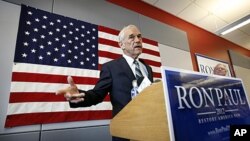In U.S. politics, Texas Congressman Ron Paul announced Friday that he will run for president next year, his third bid for the White House since 1988. Experts give Paul little chance of winning the Republican Party's presidential nomination, but his Libertarian views on foreign and domestic policy should spice up the race.
Ron Paul, 75, had a small but loyal following when he ran four years ago and expects to count on those supporters again for 2012.
Paul sets himself apart from most of his fellow Republicans on a number of foreign and domestic issues, especially his opposition to the wars in Afghanistan and Iraq.
Paul told ABC's Good Morning America program that while he supported the U.S. raid that killed al-Qaida leader Osama bin Laden, he remains an overall critic of the war on terror.
"We then went and invaded Iraq," said Paul. "We spent $1 trillion. We have lost 5,000 American lives. We have killed many, many innocent people, so the process has been very bad."
Paul first ran for president as the Libertarian Party candidate in 1988. He was first elected to Congress in Texas in 1976.
Paul is the latest candidate to join the slow-forming Republican presidential field. Former U.S. House speaker Newt Gingrich also formally entered the race this week and several more contenders are expected to make their decisions soon.
Among them is former Massachusetts governor Mitt Romney, who ran in 2008 and who is considered by some Republicans the frontrunner for the nomination in 2012.
But Romney has been hampered by conservative criticism of a health care reform plan he signed into law in Massachusetts that became the model for President Barack Obama's health care law passed by Congress last year.
Opposition to the national health care law was a major factor in Republican gains in last year's congressional elections and helped to spark the rise of the grass roots conservative Tea Party movement.
During a speech in Michigan, Romney defended his authorship of the Massachusetts law and said he opposed the Obama health care law as too sweeping.
"Our plan was a state solution to a state problem and his is a power grab by the federal government to put in place a one-size-fits-all plan across the nation," said Romney.
Romney remains at the top of most of the early public opinion polls that measure support for the various Republican contenders.
But Karl Rove, a political adviser to former President George W. Bush, told NBC's Today program that Republican voters so far do not appear impressed with the Republican field and that the contenders have a lot of work to do before the nominating process begins early next year.
"If you look at the polls there is essentially no frontrunner and these numbers give us little clue of how the race is going to play out," said Rove. "And so what people do in the months left between now and February when the Iowa caucuses are going to be really important for earning their way into the first tier of candidates and earning the vote there in New Hampshire and Iowa and South Carolina."
Just as more Republicans are getting into next year's race, polls suggest President Obama's election prospects are brightening. The president got a boost in the wake of the killing of Osama bin Laden and more voters now see Mr. Obama as a decisive leader.
However, most analysts say the president's political fate remains closely tied to the state of the domestic economy.
Matt Dallek is a political expert at the University of California's Washington Center.
"The economy, gas prices, a lack of confidence in the economic recovery will, I think by November of 2012 crowd out in a sense this issue of the war on terror," noted Dallek.
A number of recent polls suggest most Americans remain gloomy about the state of the economy, a mindset the president will continue to try and turn around in the months ahead.





